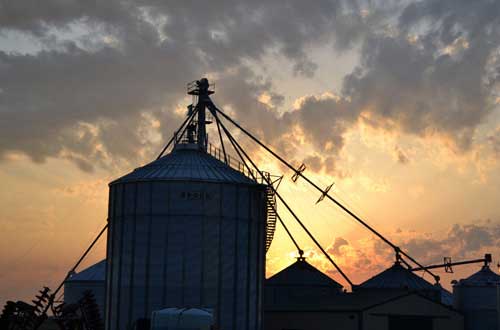$16 billion approved to help farmers hurt in trade dispute

File photo by Tom Rivers: A grain facility is pictured in Shelby. Orleans County is a big corn-grower with a lot of the crop going to the ethanol plant in Medina.
WASHINGTON, D.C. – The U.S. Department of Agriculture will spend up to $16 billion to assist farmers hurt in a trade dispute with China, President Trump announced on Thursday.
This follows the $9,567,400 approved in 2018, soybean growers getting $7,259,400 or 76 percent of that total.
“China hasn’t played by the rules for a long time and President Trump is standing up to them, sending the clear message that the United States will no longer tolerate their unfair trade practices, which include non-tariff trade barriers and the theft of intellectual property,” said Sonny Perdue, secretary of the USDA. “President Trump has great affection for America’s farmers and ranchers, and he knows they are bearing the brunt of these trade disputes.”
American farmers have faced “unjustified retaliatory tariffs and years of non-tariff trade disruptions,” the USDA said. That has curtailed U.S. exports to China.
Trade damages from such retaliation and market distortions have impacted a host of U.S. commodities, including crops like soybeans, corn, wheat, cotton, rice, and sorghum; livestock products like milk and pork; and many fruits, nuts, and other crops.
High tariffs disrupt normal marketing patterns, raising costs by forcing commodities to find new markets. Additionally, American goods shipped to China have been slowed from reaching market by unusually strict or cumbersome entry procedures, which affect the quality and marketability of perishable crops. These boost marketing costs and unfairly affect our producers.
“Our team at USDA reflected on what worked well and gathered feedback on last year’s program to make this one even stronger and more effective for farmers,” Perdue said. “Our farmers work hard, are the most productive in the world, and we aim to match their enthusiasm and patriotism as we support them.”
USDA will use the following programs to assist farmers:
• Market Facilitation Program for 2019, authorized under the Commodity Credit Corporation Charter Act and administered by the Farm Service Agency, will provide $14.5 billion in direct payments to producers.
Producers of alfalfa hay, barley, canola, corn, crambe, dry peas, extra-long staple cotton, flaxseed, lentils, long grain and medium grain rice, mustard seed, dried beans, oats, peanuts, rapeseed, safflower, sesame seed, small and large chickpeas, sorghum, soybeans, sunflower seed, temperate japonica rice, upland cotton, and wheat will receive a payment based on a single county rate multiplied by a farm’s total plantings to those crops in aggregate in 2019. Those per acre payments are not dependent on which of those crops are planted in 2019, and therefore will not distort planting decisions. Moreover, total payment-eligible plantings cannot exceed total 2018 plantings.
• Dairy producers will receive a per hundredweight payment on production history and hog producers will receive a payment based on hog and pig inventory for a later-specified time frame.
• Tree nut producers, fresh sweet cherry producers, cranberry producers, and fresh grape producers will receive a payment based on 2019 acres of production.
These payments will help farmers to absorb some of the additional costs of managing disrupted markets, to deal with surplus commodities, and to expand and develop new markets at home and abroad.
Payments will be made in up to three tranches, with the second and third tranches evaluated as market conditions and trade opportunities dictate. The first tranche will begin in late July/early August as soon as practical after Farm Service Agency crop reporting is completed by July 15th. If conditions warrant, the second and third tranches will be made in November and early January.
• Additionally, CCC Charter Act authority will be used to implement a $1.4 billion Food Purchase and Distribution Program through the Agricultural Marketing Service to purchase surplus commodities affected by trade retaliation such as fruits, vegetables, some processed foods, beef, pork, lamb, poultry, and milk for distribution by the Food and Nutrition Service to food banks, schools, and other outlets serving low-income individuals.
Finally, the CCC will use its Charter Act authority for $100 million to be issued through the Agricultural Trade Promotion Program administered by the Foreign Agriculture Service to assist in developing new export markets on behalf of producers.
Further details regarding eligibility and payment rates will be released at a later date.
Zippy Duvall, president of the American Farm Bureau Federation, issued this statement:
“The Trump Administration’s agricultural assistance package is welcome relief to an economic sector that has been battered by foreign competitors and retaliatory tariffs. We thank the President for living up to his commitment to stand by our farmers and ranchers. While farmers and ranchers would rather earn their income from the marketplace, they have been suffering during the agricultural downturn and trade war. This aid package will help us weather the storm as the Administration works to correct unfair trade practices that have hurt the U.S. economy for too long.
“We are grateful for the work that President Trump and Secretary Perdue have devoted to this issue. However, the real, long-term solution to our challenges in agriculture is good outcomes to current negotiations with China, Japan and the European Union, as well as congressional approval of the U.S.-Mexico-Canada Agreement. America’s farmers and ranchers need fair and open access to markets.”









































































